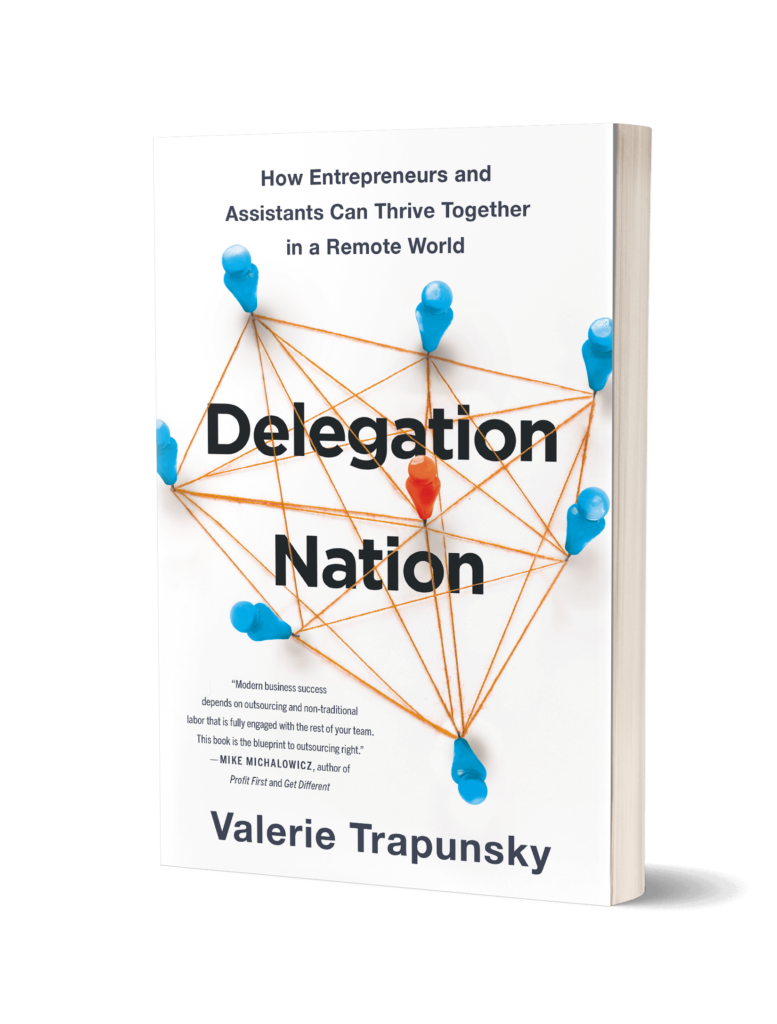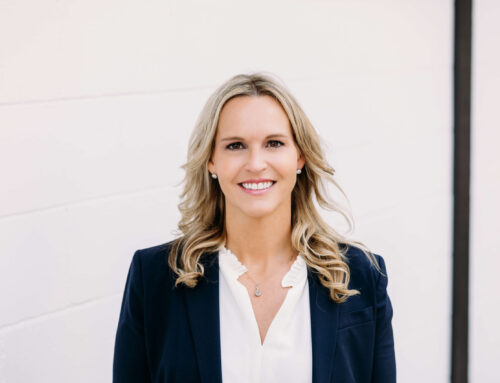Valerie Trapunsky is a former A-list personal assistant and Chief of Staff, current founder and CEO of ChatterBoss, and author of Delegation Nation: How Entrepreneurs and Assistants Can Thrive Together in a Remote World.
In this episode, Valerie talks about over-communication in a remote setting, delegation as an assistant, and the importance of character in entrepreneur <-> assistant partnerships.
LEADERSHIP QUOTE
Real integrity is doing the right thing, knowing that nobody’s going to know whether you did it or not.
– Oprah Winfrey
CONNECT WITH VALERIE
- Valerie on LinkedIn
- ChatterBoss
- delegation-nation.com
- Book recommendation: Nudge, by Richard Thaler
ABOUT VALERIE
Valerie Trapunsky is a former A-list personal assistant and Chief of Staff, current founder and CEO of ChatterBoss, the first and only remote executive assistant service of its kind. She is also the author of Delegation Nation, a book on how entrepreneurs and assistants can thrive together in a remote world. Her mission is to guide entrepreneurs to building friction-less teams using a human-centric approach.
–––
THE LEADER ASSISTANT PODCAST IS PRESENTED BY EZCATER
ezCater is the nation’s most trusted provider of corporate food solutions — the best way for companies to order food for daily employee lunches, meetings, and events of any size or budget. ezCater’s simple-to-use platform provides a network of over 100,000 restaurants nationwide, business-grade reliability, food spend management tools, and 24/7 support from their highly trained customer service team.
To explore corporate food solutions or place a catering order, visit ezcater.com.
–––
THE LEADER ASSISTANT PREMIUM MEMBERSHIP
To learn more about how you can join growth-minded Leader Assistants, check out our Leader Assistant Premium Membership for ongoing training, coaching, and community.
THE LEADER ASSISTANT BOOK
Download the first 3 chapters of The Leader Assistant: Four Pillars of Game-Changing Assistant for FREE here or buy it on Amazon and listen to the audiobook on Audible. Also, check out the companion study guide, The Leader Assistant Workbook, to dig deeper.
LEADER ASSISTANT LIVE EVENTS
Check out our constantly updated schedule of events for admins and assistants at LeaderAssistantLive.com.
JOIN THE FREE COMMUNITY
Join the Leader Assistant Global Community for bonus content, job opportunities, and to network with other assistants who are committed to becoming leaders!
SUBSCRIBE
Subscribe to The Leader Assistant Podcast so you don’t miss new episodes!
You can find the show on Apple Podcasts, Spotify, Google Podcasts, Pandora, and Stitcher.
Join my email list here if you want to get an email when a new episode goes live.
LEAVE A REVIEW
If you’re enjoying the podcast, please take 2 minutes to rate and review the show on Apple Podcasts here. Each review helps me stay motivated to keep the show going!
—
EPISODE TRANSCRIPT
Valerie Trapunsky 0:00
Hi, I’m Valerie Trapunsky And today’s leadership quote comes from Oprah. Real integrity is doing the right thing knowing that nobody’s going to know whether you did it or not.
Podcast Intro 0:17
The Leader Assistant Podcast exists to encourage and challenge assistants to become confident game changing leader assistants
Jeremy Burrows 0:33
are you tasked with ordering food for your office? Let me tell you about ezCater with over 100,000 restaurants to choose from nationwide and a 24/7 customer support. EzCater helps assistants like you and me succeed at work and makes our lives easier. Visit ezcater.com/leaderassistant to find out more. Hey everyone, welcome to The Leader Assistant Podcast. It is episode 237. And I’m very excited to be speaking with Valerie Trapunsky. Valerie is a former a list personal assistant and chief of staff and the current founder and CEO of ChatterBoss which is the first and only remote executive assistant service of its kind. And Valerie is also the author of her new book Delegation Nation, which is a book on how entrepreneurs and assistants can thrive together in a remote world. Valerie, thank you so much for being on today’s episode.
Valerie Trapunsky 1:41
Jeremy, thank you so much for having me.
Jeremy Burrows 1:43
What part of the world are you in?
Valerie Trapunsky 1:46
So my heart is in New York. I was living in New York for the past 20 something years, but recently I’ve moved to Miami, Florida. So that’s where I am right now.
Jeremy Burrows 1:59
Awesome. Awesome. Do you have any personal hobbies or favorite books or pets or kids or anything like that?
Valerie Trapunsky 2:10
Yeah, so I picked up running about five years ago. And that’s been an amazing hobby. I write about it as an intro to my book delegation nation, because it’s something that helped me manage, you know, my own stress levels helped me Matt helped me be a better kind of friend and co worker and leader and boss and so so much discipline around running. But yeah, I love reading. Absolutely. You know, it’s, I think it’s something that we have to invest in, to be able to learn and get new ideas, especially today in the kind of digital and social media world where we’re kind of always like scrolling and getting like bits of content, I love reading. And having that opportunity to kind of get like a full immerse myself in a thought from start to finish. So right now I’m reading Nudge, which is a really interesting book on how to affect decision making, without taking away any of the choices. And so it’s in the architecture of how we build our businesses, but also in how we as leaders, you know, hold conversations and, you know, get our teams on board with what we’re doing. So that’s a that’s something that’s on my bookshelf right now.
Jeremy Burrows 3:45
Interesting. And who’s the author of that?
Valerie Trapunsky 3:48
It’s Richard Thaler.
Jeremy Burrows 3:49
What I’ll do is I’ll make a note and add it to the show notes so people can
Valerie Trapunsky 3:54
check it out. Yeah, absolutely. Yeah, it’s a really good one. Great. Well,
Jeremy Burrows 3:59
like I said, I’ll put that in the show notes leader assistant.com/ 237. For those listening, want to find that. And Valerie, you know, my wife’s a runner. So you know, I love runners, but I’m not a runner myself. And one of my favorite kind of digs at runners is, you know, I’m not going to run unless somebody’s chasing me. So what do you what, what motivates you to run?
Valerie Trapunsky 4:26
You know, the same thing that motivated me to run is the same thing that motivated me to start chatterboxes the same, you know, thing that motivated me to run to write the book. It’s something about like, setting really big goals and seeing if I can accomplish them, so there’s a really big part of that and so that’s the honest reason why I got into it. I was just curious if I if I could do it. But of course while you’re preparing for such a big to achieve such a big goal Do you end up seeing that the beauty is in every single run, right? And so you build this beautiful habit for yourself. And so, at least for me about 20, or 30 minutes into a run, my mind starts thinking differently, I’m able to solve problems that kind of in my regular non moving life, I don’t have access to. So it’s been it’s been like a really cool form of meditation. And I guess you also start to get addicted to the
Jeremy Burrows 5:35
about your career. First two books in a second, but what? Yeah, you were, how did you get into the personal assistant world? And, you know, you were chief of staff. So there’s just a lot, a lot, a lot of stuff we could talk about there. But why don’t you just tell us kind of how you got into the whole world of assisting?
Valerie Trapunsky 5:56
Yeah, I mean, I got into it. on accident, I started my career as a, an advertising executive, I thought that I would stay in advertising my whole life, and that I would eventually become, I had dreams of, you know, a CEO of an advertising agency. And, you know, and that’s what I saw for myself. But I got an opportunity. I was 23, I was just looking to change agencies, but not looking to change careers. And I was introduced to somebody that was looking for a personal assistant. And it wasn’t on my list of kind of careers that I hadn’t imagined for myself. So in fact, I at first, I said, No, I don’t want to go down this path. But I took the interview anyway. And it was quite interesting, because the gentleman asked me, Well, can you travel at a moment’s notice? And, you know, how quickly does it take you to pack your bags, right, and you have the desire to be out of the country for the majority of the year, and a 23. That was super exciting. And so I took that position as a personal assistant, I ended up moving over into a chief of staff role in that, in that role that I did for a number of years. And it was, you know, we we traveled to over 65 countries, and I had an opportunity to do so many different things in business that I never imagined and, you know, help the company open up in new markets. And I saw the power of that role. And it’s, you know, it’s amazing to me, right, that, you know, kids, when you ask them, What do you want to be when you grow up? I, you know, I don’t hear many saying, right, I want to be a personal assistant or an executive assistant. But what a powerful, amazing journey it was. And I think that there was kind of there was probably no way for anyone to have explained to me, the power and the excitement, and the fact that I’ll be able to learn and see so much in such a short amount of time that I probably wouldn’t have been able to do anywhere else. So I’m, you know, feel very lucky for that kind of a detour. What I thought was a detour.
Jeremy Burrows 8:09
Right? Right. So okay, so that’s a lot of travel. Did you do the traveling with your, your executive principal?
Valerie Trapunsky 8:18
Yes. And so that was, again at 23 That was the most exciting part about it was that not only did he need someone to plan his travel, but he needed someone to be there with the guests. And so, you know, we took every trip together. And so, you know, I was running out have pages in my, in my passport, very often.
Jeremy Burrows 8:40
Wow, that’s crazy. So send me the book for travel to or did you work with like a travel agent?
Valerie Trapunsky 8:47
Yeah, so I booked the travel. I booked a lot of the travel. You know, we had kind of different providers, of course, we had different support we had, in that particular case, we kind of had our own mini travel agency, just with the amount of bookings there were, you know, because we were booking for the principal, but we were also booking for all of the guests. And when the guests had their own personal travel, it kind of ended up being like a, like a side hustle, right? Because it was really like a project. For me that wasn’t like it wasn’t it wasn’t for the money, right? It was they were doing it like now that they have access to all the points and all the systems. But yeah, so it was like a lot of fun and you got to also really know that people that we’re working with a lot like kind of like the key stakeholders, you know, within that principles life because of all the travel that we did plan even outside of, you know, related to that job.
Jeremy Burrows 9:55
Wow. So, okay, you gotta tell me, you know, If you can’t tell me who it is, can you tell me who it was?
Valerie Trapunsky 10:03
Um, I tried to stay really confidential with all of the individuals that I have supported. It was something that was, it was something that was asked of me in those roles. Yes. So I Yeah, yeah. I’m guessing reading I’ll share.
Jeremy Burrows 10:20
Okay. Sounds good. I’m guessing I’m guessing you. You don’t necessarily share all in your book, either for obvious reasons.
Valerie Trapunsky 10:28
Yeah, I don’t. And, you know, I think that it’s, I learned so much from those experiences. And, and it you know, it’s kind of like thrilling to have that experience, but also, to be able to write from the, you know, from the perspective that’s being informed by that. But yeah, yeah, I don’t share in the book, either.
Jeremy Burrows 10:57
That’s great. That’s great. Well, we’ll talk offline, then. Yeah. It’s one of the perks to being a host of a podcast, right? Yes. Well, you’ve got to tell me though, there’s got to be some, like, with all the travel adventures, and everything, there’s got to be like a funny story, or a crazy time where you got stuck on an island or, you know, something, something crazy like that, right, there’s got to be something you can share with everyone.
Valerie Trapunsky 11:26
Oh, so many times, I mean, there was, like, I’ll share something about, I don’t know, if some of the listeners can relate. And it inspired a lot of kind of, like things that happened afterwards, and how I started chatter boss, and like the foundations of it, but working as an assistant, for somebody that had that kind of a kind of amount of kind of wealth and influence. So we would travel private pretty often. And so what would happen is that this individual had a really big desire to, you know, see the world and see every single country, you know, in a, and sometimes, you know, there are certain countries that you need, permits, you know, very far in advance, and there were moments where he could convince the pilots, like, Hey, can you make a, let’s say, an emergency landing here, because we can’t get a permit. But we really want to go, and you know, and then we would end up landing and we would be in some super remote place. And we would have to find a, you know, an opportunity for, you know, 10 people to have hotels and like, somewhere to stay. And so, what was fascinating for me is that my personality does really well, with kind of last minute, things like that. I’m super flexible, right? Like, give me a challenge like that. And, you know, I’ll be able to come forward, and of course, you land and, you know, people on the island are like, you know, not prepared for you. Right? Usually, you know, there’s one hotel and, and you know, they’re getting ready for your visit for a while. So, you know, things like that would happen to us pretty often. But it’s so funny because me as an assistant, while I was really great with those kinds of like, last minute and flexible things, right? Like a plus on that. Things that I had to plan way in advance were very hard for me. So what I noticed in that role, and why eventually I started chatter boss was because the details for me were actually very boring, like details that are like way in advance, those were very hard for me to do. But things that were last minute, very flexible, you know, then I’m the woman for the job. And so I write about that a lot in the book, right? How I felt like, there was a lot of pressure as an assistant than as a chief of staff, to be the Jill of all trades to be both flexible, and you know, systematic, right, like to thrive in chaos, and to have perfect order. And what I learned is that, you know, with our personality, right, we’re either going to skew to one side or to the other, but we’re going to have a little bit more of something and a little less of something else. And so it’s it’s been a kind of a fun journey, understanding that about myself as I went through these assistant roles, giving myself the permission to be who I am, and then kind of creating a space for myself where I could just really thrive in in the ways that I am strong at and then I can get support in the in the ways that are that are not as easy for me to do.
Jeremy Burrows 14:40
Well. Yeah, I mean, that’s just it’s just fun, because, in a way, in order on one hand, what your experience about, hey, let’s make an emergency landing and let’s figure this out. It’s such a unique experience. But on the other hand, The things that you had to do, you know, in head to coordinate and project manage. And the last minute changes in the nature of all that is exactly the same as every other assistant in the world, no matter what your industry is, no matter who you’re supporting, so it’s always fun to hear those unique situations, but still hear that, you know, the skill set that we as assistants have, is transferable verbal to those situations?
Valerie Trapunsky 15:34
Yeah, absolutely.
Jeremy Burrows 15:37
So okay, so before we kind of skip ahead a little bit. Tell me about the titles, the personal assistant and in chief of staff, was that like a progression from personal assistant to chief of staff? Was it kind of a combo role? What was the chief of staff part? And how did that come into play?
Valerie Trapunsky 15:57
I love that, you ask that because I haven’t had to think about it for a long time, you know, when you put on your LinkedIn, you kind of show a linear progression on on everything. But now that you ask the truth of it was in that particular role, it didn’t actually look that way, what it looked like is that for the duration of that position, I was always the personal assistant. And that came first in that relationship and in that role, and then it was big, my desire to fill in that kind of, you know, chief of staff capacity, that I also started taking on those responsibilities, but in that particular role, like my identity, as the personnel assistant in the relationship came first, I don’t know if that makes sense. And I think that that’s not really typical in most organizations. But now that you ask it, and I like say it out loud, it was a very specific different capacity in in the role that I played, but it was it was actually simultaneous and required kind of almost like double think, in a way.
Jeremy Burrows 17:14
Right? Yeah, I mean, it makes total sense to me, because a lot of the times in my roles as an assistant, I’ve, I have had to prioritize my kind of personal assistant side, versus the executive assistant side. I found that since seasons, so there are seasons where I really need to prioritize personal assistant stuff. But then there are seasons where like, I really got to prioritize the corporate executive assistant stuff. So yeah, that makes total sense. Thanks for sharing. So okay, so then, what is chatter boss? And why did you start chatter boss?
Valerie Trapunsky 17:55
So chatter boss is a dedicated and on demand remote executive assistant company, we work with entrepreneurs and business owners, and we pair them to a dedicated assistant team. So what makes chatter boss unique is that it’s a two assistant model. So you get a dedicated assistant that does the majority of the work that knows the executive really well. And, you know, he’s kind of that main point of contact. And those are US based assistants. And then we also have a team in South Africa. And those are assistants are at our admin level. So they support as the right hand to that dedicated assistant, they also provide coverage of the assistant is out and is away. And so that model came to me because even that, before I became a personal assistant, if I had to imagine what it was like I thought that it was monogamous. I thought that, you know, for every principle that’s being supported, there is one assistant and that’s the relationship. And over the roles that I’ve held, I saw that it was not monogamous. I was often the second or the third, sometimes fourth person in the assistant mix within within those structures. And at first, to be honest, I kind of fought it psychologically, because I really had one view of it. And maybe even felt a little bit competitive. That that was the situation that I was in. Over time, I saw that there are individuals that I get to partner with that have a complementary skill set. And so that was a discovery for me kind of somebody that wasn’t looking into that role, but falling into it. What I had discovered within that position, and then I understood very quickly that if we want to provide to Whew, within chatter boss is the experience for the entrepreneur or the business owner of having that kind of 360. I can access, you know, creativity and systems, and, you know, all of these different skill sets, but all of these different traits, that is going to have to be a number of different people, because just like the entrepreneurs must stay inside of their zone of genius, so do the assistance. So we’ve created that model. And it’s been, it’s been a lot of fun for the last seven years kind of growing, that growing those relationships, and learning, you know, what makes assistants happy? What makes clients happy? What makes relationships as frictionless as possible in the remote world? So we’ve been, you know, researching a lot, learning a lot falling down a lot getting up a lot, you know, it’s been a journey.
Jeremy Burrows 20:57
Wow. So what year did you start ChatterBoss?
Valerie Trapunsky 21:01
2016.
Jeremy Burrows 21:03
Nice. And how many team members? Are you guys at right now?
Valerie Trapunsky 21:08
So right now we have 200 assistants. And we have 13 employees. So 13 internal team members, and then 200 assistants and our assistants, our contractors.
Jeremy Burrows 21:22
Nice, nice. And are you frequently hiring assistants? Or are you more looking for potential clients or both?
Valerie Trapunsky 21:34
Both, we’re always looking for both. And one of the amazing things and you know why I’m excited to be having this conversation with you. A lot of the times we get assistants that are part of your community. And I think that people who decide to belong to the leader, Assistant community that listen to you that, you know, attend your events, by the virtue of being there and absorbing this information, I believe that they really excel, they are really putting in the efforts to be at the forefront of the industry to be kind of like in the in the top of what the industry has. So I’m just I’m very excited to be having this conversation with you to have an opportunity to be heard by some of the assistants that may be looking for, you know, for a new place, kind of a new remote home, right, like a remote, you know, kind of environment to bring their gifts to because, you know, my vision for ChatterBox is a world where every entrepreneur has their dream team. But on the flip side of that, for that vision to hold true, every for every assistant to be the superstar of the team that they’re on, to be appreciated for, for their gifts and for their talents. And so we’re always, we’re always hiring, always looking for amazing assistants to join our team.
Jeremy Burrows 23:12
That’s awesome, awesome, well, I’ll put the link, it’s chatterbox.com. But I’ll link to that in the show notes at leaderassistant.com/237. You know, working with a team that large in a remote setting, what what are some one or two tips on communication or even over communication in a remote setting?
Valerie Trapunsky 23:37
Yeah, you know, I, I, we went live before the pandemic. And in those days, it felt like a lot of education around, you know, what people can do remotely, there was a lot of questions on that topic. And something that over the years of watching assistants and entrepreneurs and how they communicate, and particularly because we know that the assistant function is so different from any other function because it doesn’t have those very clear boundaries of this is the kind of work that you’re doing. It really depends on the entrepreneur, their industry, their style, right, your skill set, their skill set, etc. And so it’s been a really fun testing environment for learning different concepts. And one concept that I write about in the book that I’ve seen work really nicely for assistants and entrepreneurs is the concept of what I call over communication. So it’s a little bit like you know, Goldilocks, you go to, you know, two different bed and you try you know which one is the perfect one. And I’ve found that when we talk about communication over communication is the way to be understood in a remote setting. And what I mean by that is when you are giving information or you’re sharing what you give a little bit more than what is needed. And you’re not going to go into the over over communication territory, which is like saying unrelated information, but you’re going to give, let’s say, as the entrepreneur who’s delegating, they’re going to give information on what’s needed. And a little bit of extra on the side, perhaps what it’s for, you know, perhaps something that’s happened in the past, that may not feel exactly relevant to this task in particular. But if you get this piece of information, it allows the assistant in a remote setting to be a little bit more to have the ability to be a thought leader, because they will be able to anticipate something that wasn’t part of the, you know, initial kind of very black and white description of the task. So for the assistants as well, the over communication is important, whether we’re working with somebody that is highly organized, or not very organized, because if we’ve found that it creates trust, when I say a little bit about what I’m going to do, it’s like I’m putting on the blinkers. And I’m saying I’m about to turn right, I’m about to turn left, and you may not have any additional kind of feedback for me. But the fact that I have told you what I’m about to do, and I’ve articulated it, I find creates a lot of trust, and also allows us not to be in the position where we’re having to redo work, or we’re having to redo work less often.
Jeremy Burrows 26:45
Yeah, that’s really good. I love I love that. Kind of like a not an annoying, like, Hey, I’m gonna do this, I’m gonna do that. And don’t do that. That’s a, hey, just a heads up, this is happening. And it gives them that window to, you know, speak up and say, oh, you know, I was thinking about that. And here’s something to consider.
Valerie Trapunsky 27:07
Exactly. That’s exactly, yeah, if there was some unsaid, need or desire or want, you know, it gives that person the opportunity from both sides to be able to say, Oh, actually, maybe I forgot to tell you this, or oh, you should know this, or actually don’t do that. I’ve, you know, I’ve done it that way before. And, you know, there’s like some underwater stone there. So yeah, that’s it’s exactly right. It’s just, especially in a remote setting, because we are when we’re delegating and we’re receiving delegation, it’s in a much more kind of quick context, that giving a little bit of extra is just the same as you know, when we’re in person, we have the tendency to share a little bit more. So it doesn’t come as naturally in a remote setting. And we kind of have to put in processes to remind ourselves to do that.
Jeremy Burrows 28:04
Alright, so what about couple quick tips on delegation, obviously, your book is called delegation nations. So I would love to hear maybe just your top number one tip for delegating.
Valerie Trapunsky 28:21
So one big thing that I talk about is personality, and you know, how our personality impacts the way that we delegate or the way that we are, you know, that we are receiving delegation. And so one thing that I’ve heard from entrepreneurs and business owners is they have this fear of a lot of them have a fear of micromanaging. And so they end up saying less than what is needed. And a lot of the times where that goes to the extreme is where somebody gives a task or a project, they onboard, somebody new for the first time. And then for the fear of kind of being seen as a micromanager. They say, You know what, I’m not going to check in or have any more conversations about this project. And whenever you’re done, just bring it back to me complete. But we find a lot of the times in a remote setting is that this ends up failing and in a non remote setting as well. But I say in a remote setting because we have in the remote executive assistant world in the kind of relationships we have. We have less access, right, less opportunities for synchronous communication, and we oftentimes receive less information than is desirable. And so delegating in that way, opens up The so much opportunity for the project having derailed in a way that you didn’t want or anticipate, and makes it very frustrating on the assistance side, because the person kind of teased you with all of this autonomy. And the truth is that there were some really real preferences. And so I’ll always say, you know, on both sides, going back to that concept of, of over communicating, but going back to that piece of, if you are the one doing the delegation, that you want to continue to check in along the way. And that sets up a good practice and gives opportunity to chime in, or to course correct or to share things that have changed along the way. And I’ll always encourage assistants on the other side, who are in the receiving end of maybe very broad, open ended, kind of projects where now the principle has kind of disappeared until you hand off, to offer updates along the way, even if they’re not being requested, to request that synchronous time to have an opportunity to share what’s going on. Because a lot of the times we see that if something is shared as an update via email, many entrepreneurs, don’t check it, unfortunately. But that synchronous communication really seems to land and that’s where in the delegation process you you get the very crucial information you need to do to do a good job.
Jeremy Burrows 31:40
Love it. What What about character? So you know, the entrepreneur, slash Asst. Partnership. You know, sometimes one, one party has good character, the other party doesn’t character can be poor on both both sides or good on both sides. What’s What are your thoughts on the importance of character? Yeah, so
Valerie Trapunsky 32:07
character, what we like to say is that there’s no such thing as a good or bad character. But understanding your character, and how that impacts delegation, both as an entrepreneur and as an assistant who’s delegating the work to others, plays an important part. And so when I look at matches, for example, between clients and assistants, how I want to make sure that they’re set up for success is, let’s say, I’m looking at the parameter of organization, an assistant can have high organization skills, and the client can have higher right, the client can be like in the top, you know, five percentile. And so there’s nothing good or bad about either of those scores. But what’s important to understand is who you are working with, and where you are in comparison on that continuum. And so I like to do pairings with that in mind. So nothing good or bad if we have individuals that are the the parameter will be called dependability, which is which is linked to organization, you can have assistants with low dependability, and they’re amazing. And they’re really amazing at one type of work. And Assistants with very high dependability are amazing and other kinds of work. And so I am a person and was an assistant with low dependability. So I used to believe what that what that meant is like that I’m a fraud, right? Like, how can I be an assistant with this parameter when I learned it? I’m like, If anyone finds out, I’ll never get another job in this town, you know. But then I learned Wow, right? I can have this this is a, if I know what it is. And if I know where there is a weakness, and where is there a strength in here, then it could actually be my superpower, right? So today, I use it as my superpower. But in those days, for me was like a lot of shame. And a lot of, you know, I was very, very stressed that that parameter worked in that way. And so today when we are hiring, our assistants will take a character assessment, but it’s never it never. It’s never for the purpose of like hire or not to hire. It’s always for the purpose of who’s going to be the best match. That’s going to work with your natural personality. You know, and then and then there’s other parameters that we look at in that same way but I want to make sure that I’m setting the assistant up for success. And I’m setting the entrepreneur up in a way where they’re delighted, naturally delighted by the assistance, natural gifts and personality.
Jeremy Burrows 35:00
So what kind of do you guys use? Like a, an assessment process or personality or values, tests and stuff like that to try to help match assistance with entrepreneurs?
Valerie Trapunsky 35:11
Yeah, yep. So we use, we use the five factor model, which is the most widely accepted within, you know, psychological communities. What makes chatter boss unique with using this particular assessment is the way that we do the algorithm and the pairing. So what’s actually really interesting is like, if you look at kind of traditional uses of this assessment, it will say, don’t hire assistance with this, this and this. So there is still like a long way to go, in fact, for any position don’t. So in fact, what you’re saying, right? Like, is there good or bad character, I believe there’s no good or bad character, it’s about knowing who you are, and how to leverage your natural character to be inside of your zone of genius at all times, right. But there’s still a lot of hiring, that’s done in a way that says, This is good. And this is bad. And I think that in the world of IO, psychology, we still have a very long way to kind of, you know, to, to remove some of that bias related, right and, and to do hiring in a different and a new and a unique way. And that’s what I hope to do. You know, with chatter boss, right to make a difference in in that world, in the place of psychometrics.
Jeremy Burrows 36:34
Love it, love it? Well, thanks for sharing again. And, you know, what, what made you want to write a book and tell us kind of a brief summary of what the books about and who it’s for?
Valerie Trapunsky 36:45
Yeah, you know, I, I really wanted to write a book for a very long time, it must have been five years or so it was. Now looking back on it, I think that the biggest internal push to wanting to write a book was the desire to understand the principles that are kind of coming to me intuitively, that I really couldn’t phrase like, I couldn’t give rules for what I’m doing. But I felt like what I’m doing is working in this space. And so I think first and foremost, there was this kind of maybe subconscious desire to decode and understand and organize my own thoughts. And then when I started to get really serious about it, that’s where you know, you and I connected for the first time, and I was, you know, really grateful for your feedback. And that’s where I got acquainted with the community and your book. And so that meeting people who wrote books in this category, was also really inspiring. And then, you know, and I, that was the biggest motivator, I think, internally to understand myself. But then, of course, wanting to make an impact on entrepreneurs and assistance. There was like, so many things that I felt in the industry were kind of like, unsaid rules. Something like, you know, we were just talking about the personality piece that I really wanted to kind of debunk, right, I wanted to create a piece of content, a long term piece of content that said, Hey, bring your full self, entrepreneur and assistance. And this is how you can find a good long term pairing for yourself. And so wanting to encourage entrepreneurs to delegate in healthy ways, wanting to encourage assistance to work in the kind of partnerships with their clients that are healthy, you know, where they can enforce boundaries, and just to you know, overall, at the end of the day, we work to be happy, right? We work for, for a number of other things, right? But, but we really want to be working so that we have happiness. And so that’s what I was hoping to accomplish with this book is just to encourage that from both sides.
Jeremy Burrows 39:22
Nice. Awesome. Well, definitely check out the book. I’ll link to it in the show notes at leader assistant.com/ 237 For those listening, definitely worth your time and energy to check that out. These I love the subtitle so the book is called delegation nation. And the subtitle is how entrepreneurs and assistants can thrive together in a remote world. So and you know, as an audio podcast, you’ll have to check out the show notes to see the book cover but I will say that salary your you and the team did a good job on the book cover. I’m a big fan of it.
Valerie Trapunsky 40:04
Oh, thank you so much Jeremy and you know, when we were working on the cover, you know, it’s making a cover is hard work. And it’s it’s amazing because all of the conceptual like between like what assistants are so many times conceptually, I kept going back to your cover like that, that view of it. I’m like, it’s so smart. I’m like, I can’t believe he got it. Because like, like I had, like different designers who hadn’t seen your cover, work on it, and they kept bringing back like something in that realm. I’m like, dammit, like. It’s just like such a good visual representation. So that means a lot to me. You saying that?
Jeremy Burrows 40:52
That’s great. Well, Valerie, thank you so much for being on the show. And I’m excited for your book success and your chatterbox business success and all the fun things. What, what’s maybe the number one place for people to reach out and find out more about you and chatbots and your book and, and everything else?
Valerie Trapunsky 41:13
LinkedIn is wonderful. I love connecting with assistants on LinkedIn. So that’s a wonderful place my I like to say my virtual door’s always open in that way, of course, to learn about chatterboss, chatterboss.com. And then the book is Delegation-Nation.com. So very much looking forward to connecting.
Jeremy Burrows 41:40
Awesome, well, I’ll put all those links in the show notes leaderassistant.com/237 So people can check it out. And thanks again for being on the show. And thank you to those listening. Thank you so much for your support and for listening. Be sure to reach out and say hi to Valerie and hope you all have a great day and Valerie thanks so much.
Valerie Trapunsky 41:58
Thank you Jeremy. Thank you.
Unknown Speaker 42:11
Please review on Apple podcasts.
Unknown Speaker 42:20
Goburrows.com










